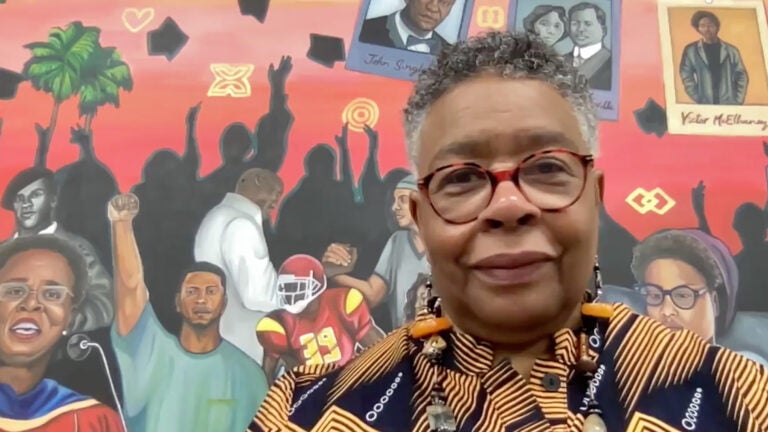
USC panel offers complex perspectives on Juneteenth holiday
“How does one be celebratory when thinking about a history of over 250 years of enslavement?” USC’s chief inclusion and diversity officer asks.
Francille Rusan Wilson had a heartfelt question for members of the USC community who gathered Monday for a virtual event celebrating Juneteenth and discussing its history.
“After 157 years, isn’t it time for all Americans to commit to freedom and justice for all?” asked Wilson, an associate professor of American studies and ethnicity, history, and gender and sexuality studies at the USC Dornsife College of Letters, Arts and Sciences.
Wilson provided historical context on the newest federal holiday, which marks when the last of enslaved people in United States were liberated. It wasn’t until June 19, 1865, that Union forces reached Texas to announce and enforce the end of slavery there — 2 1/2 years after President Abraham Lincoln’s Emancipation Proclamation.
Wilson was among the faculty, staff and students who participated in the USC Juneteenth event that included remarks from President Carol L. Folt and a live panel discussion titled “Triumph Over Adversity” moderated by USC Chief Inclusion and Diversity Officer Christopher Manning.
USC Juneteenth commemoration marks America’s true Independence Day
Manning said he prefers to think of Juneteenth as America’s true Independence Day. “It is the first day in American history in which we were all truly free,” he said. “It is important to celebrate and remember that as a central part of our heritage.”
Juneteenth has been celebrated by Black families for generations but gained wider attention after the murders of George Floyd and others by police. A little more than a year ago, President Joe Biden signed the Juneteenth National Independence Day Act making the day a federal holiday.
Wilson said that, in the early days of liberation, Black Texans considered Juneteenth to be their Fourth of July and a holiday — something often opposed by their employers and local officials.
The lessons of Juneteenth are that our fundamental freedoms can never be taken for granted.
Francille Rusan Wilson,
USC Dornsife professor
“Juneteenth celebrations served to gather the community, to plan protests, as well as to mark the resilience and determination to thrive,” she said. “The lessons of Juneteenth are that our fundamental freedoms can never be taken for granted. They must be exercised, protected and practiced.”
Several of the participants in the USC event acknowledged mixed feelings about the occasion because of the centuries of pain and struggle behind it.
“Is it a holiday? Is it a commemoration?” Manning asked. “How does one be celebratory when thinking about a history of over 250 years of enslavement followed by nearly 100 years of Jim Crow [anti-Black laws] followed by continued structural oppression? Is that something to celebrate?”
‘A little conflicted’ at USC Juneteenth commemoration
Panelist Miki Turner, associate professor at the USC Annenberg School for Communication and Journalism, described herself as “a little conflicted” about Juneteenth. She said she would be feeling more celebratory if the federal holiday had come before the series of well-publicized killings of unarmed Black Americans in the past decade by police and others.
“Is it a reasonable ask for us to celebrate the end of slavery in an era when we are experiencing this sort of heinous, regressive renaissance in our country?” Turner asked. “I think any of us who were born when Jim Crow was still in a shallow grave have issues reconciling the past with today.
“I hope we can use this day to reflect on where we’ve been and where we need to go,” Turner added. “I certainly hope it won’t be just another day to fire up the grill and drink Red Pop. It needs to be more than that.”
I think we are an extraordinary people.
Ricky Bluthenthal, Keck School of Medicine of USC
Panelist Ricky Bluthenthal, professor of population and public health sciences and associate dean for social justice at the Keck School of Medicine of USC, said that despite the barriers, many African Americans have managed to find a way to thrive.
“I think we are an extraordinary people,” Bluthenthal said. “I feel like each day I learn something new about the amazing accomplishments of our group in the context of violence, systematic exclusion, material deprivation. We’ve triumphed. If we remove these barriers, even more good things will flow our way.”



